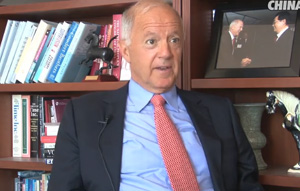Meager pension benefits vex rural doctors
Updated: 2013-06-10 14:22
(Xinhua)
|
|||||||||||
In addition, requirements related to prescriptions, medical fees and equipment have also become more strict.
"Now we are doing the same job as the doctors in urban hospitals, bearing no less pressure or professional risk, but they are regarded as employees of health institutions and are entitled to better pension payments, whereas we are not," Ye Zhaochun said.
According to Wang, the current pension system for retired employees requires employers to make substantial contributions to the pension funding pool. However, as village doctors are not fully recognized as employees of any specific institutions, they have no clearly defined employer to pay the fees and thus cannot receive pension benefits.
According to Huang Liang, director of a hospital in Fenggao county, where Yangyan is located, poor pension prospects are a major complaint for many village doctors. Many of them have abandoned their jobs.
The pension problem is representative of the urban-rural gap in China and the solution lies in urbanization, said Zhang Shuo, a health economics specialist at the World Bank.
Zhang stressed the importance of retaining rural village doctors amid the country's efforts to enhance rural medical services.
Wang also called for more government investment to tackle the problem.
To reassure the doctors, a local government in East China's Jiangxi province is issuing special subsidies of 65 yuan each month for every senior village doctor with more than 20 years of work experience. In other regions, such as Ningxia and Yunnan, local governments are paying the premiums for the doctors' pensions.
Zhong Ruijin, a village doctor in Chongqing's Qianjiang district, signed a labor contract with a hospital in his town in 2009 and joined the pension program in 2012.
After he retires, he will receive a monthly payment of at least 1,000 yuan.
Related Stories
Rural doctor who has worn out 20 bikes 2013-03-01 14:30
Rural doctors pressured by medical reform 2013-01-09 21:26
Vice premier urges cares for rural doctors 2013-01-07 04:19
Rural doctors cut HIV/AIDS infection in China 2012-11-30 10:51
Rural doctor is village lifeline 2012-09-24 17:40
Today's Top News
Ex-CIA man says he exposed US spy scheme
China, US ready to
open a new chapter
Fortune smiles on Chengdu as forum concludes
CPI suggests weaker economy
ROK, DPRK to hold govt meeting
Automakers gear up for an Eastward drive
Former railways minister stands trial
Young Chinese eye fancy car market
Hot Topics
Lunar probe , China growth forecasts, Emission rules get tougher, China seen through 'colored lens', International board,
Editor's Picks

|

|

|

|

|

|





